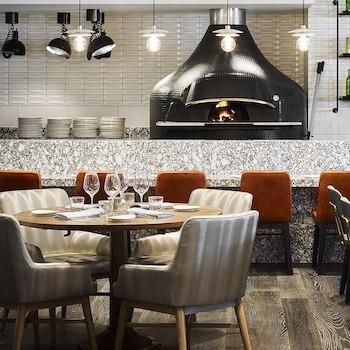As cities and states across America slowly reopen for business, our leaders claim to be "following the science" as they lift restrictions.
Of course, there is no scientific consensus on how to reopen a society during and after a pandemic. Thus, politicians are just making stuff up as they go along. Some ideas are better than others. A perfect example of a bad idea came from Washington State, which allowed public construction projects to proceed while private construction was shut down. That was a completely arbitrary decision that was not based on scientific data and was likely politically driven.
But Washington State may have redeemed itself with a pretty good idea: For restaurants to allow customers to dine in, they must keep a log of names and contact information.* That way, if there's another COVID-19 outbreak, contact tracing will be a lot easier.
Pros and Cons of Restaurant Customer Logs
Every policy has pros and cons. For this one, the con is easy to predict: Some people will complain about a violation of privacy. ("The government doesn't need to know where I ate my chicken nuggets!")
However, this argument isn't particularly convincing. Once you leave your home, you've largely given up your right to privacy, as evidenced by a world full of security cameras. Besides, if the government really wants to find you, it can track you down based on things like credit card transactions and cell phone usage. So, in my opinion, restaurant customer logs are hardly a threat to privacy, certainly when compared to alternatives like GPS trackers.
The pro side of the debate goes far beyond the ongoing coronavirus pandemic. The CDC estimates that, each year, 48 million cases of food poisoning occur, resulting in 128,000 hospitalizations and 3,000 deaths. Of these 48 million cases, the CDC can pinpoint the cause in only about 9 million of them. The rest are unknown.
Why? Think about how hard it is to identify what made you sick. Was it the old lunch meat in the refrigerator? Was it the sandwich at the coffee shop? Or wait... did I even eat a sandwich at the coffee shop? Maybe it was the deli.
The other problem is that most people don't contact the health department after they get sick. Like voting, this should be considered a civic duty. If you suspect food poisoning, contact the local health department. If enough people call complaining about an illness at restaurant X, then the health department might end up investigating. Perhaps it will save someone's life. At the very least, it could save someone from writhing in pain on the toilet for 12 hours.
Restaurant Customer Logs Are a Good Policy
Needless to say, contact tracing for coronavirus and foodborne disease investigations become a lot easier when public health officials have the names of people who ate at various restaurants. Even if COVID-19 goes away, Salmonella, E. coli, and norovirus will not.
Update on June 3, 2020 @ 9:44 a.m. ET: Soon after this article was published, Washington State rescinded the policy. Providing such information is now voluntary.




